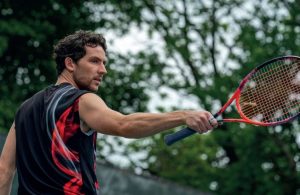I have never taken our two German short-haired pointers hunting. If I did, it wouldn’t go well. The male (Hank) is afraid of loud noises. When it thunders, he follows me around the house, glued to my leg, shaking. We think leaving him alone at the house as a puppy one Fourth of July did him in. The female (May) loves chasing smoke and water. When I cook burgers, she yelps and flies through the air to “bite” the smoke from the grill. She does the same thing when we water the lawn. If I were to go duck hunting with them, I’d have to fetch the ducks myself. They are too old to go hunting now anyway and sleep all day.
I have wondered, though, if they dream of hunting. Not the human sport we call hunting, since they don’t know what it is, but chasing prey. They both have yelped in their sleep and move their legs in a way that looks like they might be chasing something.
In Aeon, David M Peña-Guzmán writes about new research on animal sleep. There is much we don’t know, and the research remains highly speculative. But there is some evidence that animals do, at least, replay episodes from reality in their sleep:
The idea that other animals enact virtual realities while asleep is supported by research on mental replay, a neuronal event that occurs when the sleeping brain replays episodes from waking life. Birds, for example, replay their songs while asleep in order to better memorise them. Rats also replay episodes from waking life, except that they tend to replay visual rather than auditory experiences. When they fall asleep, they often immerse themselves in a multifaceted dreamworld whose spatial coordinates seamlessly mirror those of their waking milieu.
Although not all instances of mental replay herald a dream sequence, some do, according to Josie Malinowski, David Scheel and Mitchel McCloskey, whose exciting paper on animal dreaming was published in 2021. This shows that sleep is not a long and monotonous mental slumber for animals, but a fluctuating mental reality punctuated by moments of conscious awareness.
This isn’t quite the same as human dreaming, which is far more inventive, and the fact is we will never know what dogs dream for the same reason we will never know what it feels like to be a bat, as Thomas Nagel told us almost 50 years ago now.
In other news
Ann Coulter reviews Dinesh D’Souza’s “stupid movie” 2,000 Mules: “Using cellphone tracking data obtained by ‘True the Vote’ (which sounds like a group named by Melania Trump — ‘BE BEST!’) D’Souza claims to have proof that 2,000 people delivered multiple ballots to election drop boxes in the five crucial battleground states that Trump lost.”
The kids are not alright:
I embraced the baby-led approach with enthusiasm that was really relief. Hell, I didn’t know how to do anything with these babies – I was just some idiot who put their nappies on the wrong way round every time. How marvellous I could delegate all complicated decisions to my infants! Now they wouldn’t scream at me anymore when I tried to make them do something they didn’t want, i.e., have a nap. The babies would be in charge. This did not work out as well as I’d hoped. Baby-led weaning was fine. Baby-led sleeping, however, meant that none of us slept at all. It turned out that my babies were even more clueless than me about how they should be raised . . . The first generation of kids who grew up with the baby-led approach are now in their late teens and early 20s, and we are currently living in a baby-led world. Young people have always believed that they know better than the older generation, and now the older generation agrees with them.
Speaking of kids, we should ban them from social media, Christine Rosen writes in the latest issue of National Review: “Why don’t we have a legally enforceable age requirement for the use of social media? As a society, we long ago agreed upon age-restriction laws governing a range of behaviors (driving, voting, enlisting in the military, smoking, drinking alcohol, getting a tattoo). Why do we treat social-media use differently?”
The pleasures of gardening: “Is there anything more magical than digging up home-grown new potatoes? Yes, the gluttonous gardener will respond: the first bite of creamy sweetness when you serve them up with nothing more than a curl of salty butter and a scattering of fresh herbs.”
Allen C. Guelzo reviews Woody Holton’s Liberty Is Sweet: The Hidden History of the American Revolution:
It would be easy to expect something radical from Holton in Liberty Is Sweet, especially since Nikole Hannah-Jones also provided him with a blurb. What is surprising, however, is how conventional the book turns out to be, especially for a work whose subtitle promises a “hidden history of the American Revolution.” Holton wants to tell a tale of a revolution that was “powerfully influenced” by “little known conflicts and external forces,” one full of “obscure Americans” — American women who “pressured reluctant merchants to stop importing British manufactured goods” or “Continental soldiers” who pressured their officers “to lead them into battle against the redcoats” or black slaves who “helped transform their white neighbors’ resistance to imperial reform into a demand for revolution.” But across the expanse of 569 pages of text, comparatively few “hidden” players actually emerge onto Holton’s stage. Overall, his narrative largely follows the trail of precisely the same generals, politicos, and fixers who can be found in Piers Mackesy’s The War for America, 1775–1783, John R. Alden’s A History of the American Revolution, Robert Middlekauff’s The Glorious Cause, Stephen Conway’s The War of American Independence, 1775–1783, or even Gordon Wood’s compact The American Revolution.
The real threat to the university, Jackson Lears writes, “is not political correctness—though the tyranny of various ideological fashions (right and left) is real, and can be oppressive. The main menace is market-driven managerial influence: the impulse to subject universities to quantitative standards of efficiency and productivity, to turn knowledge into a commodity, to transform open sites of inquiry into corporate research laboratories and job training centers.”
Jennifer Schuessler writes about Will Arbery’s new play, Corsicana: “Most simply, Corsicana, which runs until July 10 at Playwrights Horizons, is about four people in that small city in Texas, including a young woman with Down syndrome, her aspiring filmmaker brother and a reclusive self-taught artist who comes into their orbit. Inspired by Arbery’s relationship with his older sister Julia, it’s the rare play to feature both a lead character — and a lead actor — with Down syndrome. But it’s also, Arbery said, a play that ‘very stubbornly defies about-ness.’”
The Parthenon Marbles might be returned to Greece: “British Museum chairman George Osborne said this week that there is a ‘deal to be done’ regarding the Parthenon Marbles, a set of ancient Greek sculptures owned by the London institution that many have said should be returned to Greece. For years, despite pushback from experts and Greek politicians, the U.K. has held firm to the idea that it is the rightful owner of the Parthenon Marbles, which are sometimes labeled the Elgin Marbles. But in the past year, there have been some possible signs that the U.K. was more open to repatriating them than it had formerly been.”
John Wilson recommends the 1951 Angels in the Outfield: “Angels in the Outfield was remade in 1994 (set in California!), but I’ve never had the heart to watch that version. The original is so redolent of a particular era in American history: not by any means an ideal time, but one with strengths and weaknesses quite different from those of our current moment.”


















